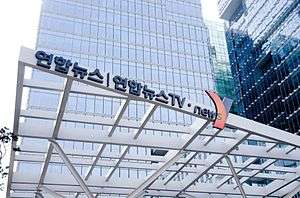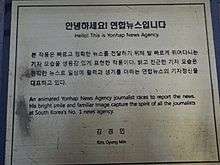Yonhap News Agency
Yonhap News Agency (Korean: 주식회사 연합뉴스) is a South Korean news agency. It is a government-funded company, based in Seoul, South Korea. Yonhap provides news articles, pictures and other information to newspapers, TV networks and other media in South Korea.
 | |
| Founded | 19 December 1980 |
|---|---|
| Headquarters | Seoul, South Korea |
Official website | en |
Predecessor agencies and establishment
Yonhap (pronounced [jʌ̹n.ha̠p̚], Korean: 연합; Hanja: 聯合, translit. Yeonhap; meaning "united" in Korean) was established on 19 December 1980, through the merger of Hapdong News Agency and Orient Press.[1] The Hapdong News Agency itself emerged in late 1945 out of the short-lived Kukje News that had operated for two months out of the office of Domei, the former Japanese news agency that had functioned in Korea during the Japanese colonial era.[1]
In 1999 Yonhap took over the Naewoe News Agency. Naewoe was a South Korea government-affiliated organization, created in the mid 1970s, and tasked with publishing information and analysis on North Korea from a South Korean perspective through books and journals.[2][1] Naewoe was known to have close links with South Korea's intelligence agency,[2] and according to the British academic and historian James Hoare, Naowoe's publications became "less partisan after the late 1980s and are often useful source of information on North Korea".[3] In 1999 Naewoe merged with Yonhap News Agency,[1] with materials on North Korea continued to be "distributed for free as part of the government's propaganda effort".[3] According to the U.S. Library of Congress "Originally a propaganda vehicle that followed the government line on unification policy issued, Naowae Press became increasingly objective and moderate in tone in the mid-1980s in interpreting political, social, and economic developments in North Korea".[4] Naowae's principal publication was the monthly magazine Vantage Point: Developments in North Korea, which continued to be published by Yonhap until its discontinuation in 2016.[5]
History
Yonhap maintains various agreements with 78 non-Korean news agencies, and also has a services-exchange agreement with North Korea's Korean Central News Agency (KCNA) agency, signed in 2002.[6] It is the only Korean wire service that works with foreign news agencies,[7] and provides a limited but freely-available selection of news on its website in Korean, English, Chinese, Japanese, Spanish, Arabic, and French.
Yonhap was the host news agency of the 1988 Seoul Summer Olympics and was elected twice to the board of the Organization of Asia-Pacific News Agencies (OANA).
Yonhap is South Korea's only news agency large enough to have more than 60 correspondents abroad and 580 reporters across the nation.[6] Its largest shareholder is the Korea News Agency Commission (KONAC).
In 2003, the South Korean government passed a law giving financial and systematic assistance to the agency, to reinforce staff and provide equipment.[7] In the legislation, it was also given the role of “promoting the country's image” to an international audience.[6] The head of the Yonhap agency is usually affiliated with the government, which critics say harms press freedom and influences news-gathering. However, it is government affiliation, rather than press laws (which are supportive of press freedom), which is said to be the cause of any limitations,[8] though the agency does criticise the government.[9]

Journalists
Yonhap employs about 580 reporters. It claims to have more than 60 correspondents in 35 countries.[6] Yonhap is one of few Korean news organizations with a section specialized in North Korea reports. In 1998, Yonhap acquired from the National Intelligence Service a news wire service monitoring North Korean media and analyzing North-Korea-related information. Yonhap incorporated the firm and its staff into the newsroom, creating a special division (often referred to as the 'N.K. news desk') to improve its reporting on North Korea. In January 2009, two reporters from the N.K. news desk disclosed that Kim Jong-un had been chosen as heir apparent to North Korea's longtime leader, Kim Jong-il. Later, in 2010, the reporters won the grand journalism award for the exclusive story from the Korean Journalist Association. It was the first time in nine years that the association had awarded the prize.[10]
The Cho Gye-chang award
The Korean Journalist Association in 2010 established the Cho Gye-chang Journalism Award for achievement in international news reporting to commemorate Cho Gye-chang, the former Yonhap correspondent in Shenyang, China.[11] Cho was killed in a car crash in December 2008 on the way back, after having conducted an interview with a Korean-Chinese academic. He was assigned to Shenyang in 2006 as the first South Korean correspondent in the northern Chinese city. Cho was widely admired as an ardent news writer who focused on North Korean affairs and Korean-Chinese communities. On the first anniversary of his demise, Korean-Chinese organizations and local journalists paid tribute to him as a "truly hardworking reporter with great professionalism".[12] Mr. Cho's death marked the first time that Yonhap had lost a reporter on an international assignment.
See also
- Communications in South Korea
- List of Korea-related topics
- Media of South Korea
References
- Hoare, James E.; Pares, Susan (2005). A Political and Economic Dictionary of East Asia (series: Political and Economic Dictionaries) (1st ed.). London: Routledge - Taylor and Francis Group. p. 348. ISBN 978-1857432589.
- Hoare, James E. (2012). Historical Dictionary of Democratic People's Republic of Korea (series: Historical Dictionaries of Asia, Oceania, and the Middle East). United Kingdom: Scarecrow Press - Rowman & Littlefield Publishing Group. p. 271. ISBN 978-0810861510.
- Hoare, James E. (2015). Historical Dictionary of the Republic of Korea (series: Historical Dictionaries of Asia, Oceania, and the Middle East) (3rd ed.). United Kingdom: Rownman & Littlefield. p. 337-338. ISBN 978-0810849495.
- U.S. Library of Congress Federal Research Division (1992). Matles Savada, Andrea; Shaw, William (eds.). South Korea: A Country Study (Area Handbook series) (4th ed.). United States: Library of Congress. p. 249. ISBN 978-0844407364.
- Park, No-hwang (January 2016). "Discontinuance of Publication" (PDF). Vantage Point: Developments in North Korea. Yonhap News Agency. 39 (1): I. Archived (PDF) from the original on 19 November 2017. Retrieved 18 November 2017.
- "About Us". Seoul: Yonhap News Agency. 2009.
- Shrivastava, K. M. (2007). News Agencies from Pigeon to Internet. Elgin, IL: Sterling Publishers. ISBN 978-1-932705-67-6.
- Sin, T.; Shin, D.C.; Rutkowski, C.P.; Pak, C. (2003). The Quality of Life in Korea: Comparative and Dynamic Perspectives. London: Kluwer. ISBN 978-1-4020-0947-1.
- See e.g. (2nd LD) "S. Korean lawmakers heap criticism on government's reversal in airstrip row". Yonhap. January 12, 2009.
- "미디어오늘 9년만의 한국기자상 대상 연합뉴스 최선영 장용훈 기자". mediatoday.co.kr. Retrieved 6 February 2012.
- "Cho Gye-chang Journalism Award". www.journalist.or.kr (in Korean). Retrieved 5 May 2018.
- "조계창 특파원, 정말 부지런했던 기자" Yonhap. Retrieved February 17, 2012.
External links

- Official website
